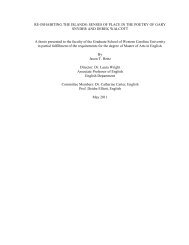SUMMERS, KAREN CRADY, Ph.D. Reading Incest - The University ...
SUMMERS, KAREN CRADY, Ph.D. Reading Incest - The University ...
SUMMERS, KAREN CRADY, Ph.D. Reading Incest - The University ...
Create successful ePaper yourself
Turn your PDF publications into a flip-book with our unique Google optimized e-Paper software.
143<br />
the wrong party and ends up restoring it to the rightful owner. And it is discovered in the<br />
last pages of the novel that Otranto is <strong>The</strong>odore’s by way of his mother’s inheritance and<br />
not by his father’s, which disrupts and undermines the idea of patriarchal supremacy and<br />
adds to the destabilization of the family. <strong>The</strong> true wealth and power comes through<br />
matriarchy, not patriarchy, but Manfred and his father before him ignored and suppressed<br />
this fact for decades so that they could consolidate and power for themselves. Thus in<br />
Walpole’s novel matriarchy restores order while in his drama it destroys order—but both<br />
instances serve to promote the idea that patriarchy is the only viable way for a society to<br />
succeed. <strong>The</strong> threat to the family in the novel comes from Manfred’s loss of self-control,<br />
a theme that we have seen at work before. Like Gower’s King Eolus who killed his<br />
young daughter out of unchecked rage, Manfred’s ego overpowers his reason. Both<br />
fathers are consumed with a sense of their own self-importance. Manfred’s sole desire is<br />
to retain his castle, his lordship, and his power; his passion is excited primarily by his<br />
obsession with the family curse which predicts that his line will lose dominion over<br />
Otranto. Manfred came into possession of Otranto as a result of his grandfather’s<br />
usurpation of the rightful owner. Walpole is at pains to explain to his reader in the<br />
preface to the first edition that he wishes the ‘author’ of the tale had “grounded his plan<br />
on a more useful moral than this; that the sins of the fathers are visited on their children<br />
to the third and fourth generation” (Walpole 7).<br />
By the end of <strong>The</strong> Mysterious Mother, Adeliza is sent to a convent, Edmund<br />
leaves Narbonne to seek his death in war, and the unfortunate Countess stabbed herself<br />
with Edmund’s knife. As in Gower’s tale of Canace and the Duchess of Malfi, and in <strong>The</strong>
















